FOCUS: CHAMPIONS OF NURSING DIVERSITY AND DEI
JUNE 2024

Focus: Champions of Nursing Diversity and DEI

JUNE 2024

Focus: Champions of Nursing Diversity and DEI
Upholding diversity, equity, and inclusion (DEI) within nursing is crucial to ensure that all patients receive high-quality and fair healthcare. By embracing DEI principles, nurses can gain a deeper understanding of the diverse needs of various patient populations, advocate on their behalf, foster a more inclusive healthcare setting, and ultimately enhance health outcomes.
This month, Minority Nurse proudly shines a spotlight on the significance of DEI in nursing and honors the remarkable Champions of Nursing Diversity. These individuals are not just leaders but beacons of inspiration, guiding us toward a more diverse and inclusive future in healthcare.
In 2023, we introduced the Champion of Diversity series, showcasing healthcare leaders driving positive change within their organizations and the nursing profession. In this edition, we applaud the top three profiles from this series.
Nursing Diversity Champions embody a steadfast dedication to diversity and inclusion within accredited nursing programs and healthcare facilities throughout the United States. We commend their tireless efforts and unwavering commitment to these vital initiatives.
Moving forward, we must not just prioritize, but champion DEI in nursing. This is not merely a call to action but a shared responsibility, a commitment to shape a more equitable and compassionate healthcare system for all. Let us not become complacent, but rather let us be the catalysts for change.
-Reneé“Of all the forms of inequality, injustice in health care is the most shocking and inhuman.”
— Martin Luther King,
Jr.
 By Keith Carlson
By Keith Carlson
Certain concepts frequently enter the popular consciousness and become a timely part of the current vocabulary. Diversity, equity, and inclusion (DEI) is one such concept, as are environmental awareness and the science of climate change.
While the overall effect of these terms becoming more popular and part of the general consciousness is very positive, we also have to watch for these concepts being co-opted and used solely for public relations and sloganeering.
In these times of ongoing and profound collective reckoning with issues of systemic racism and a lack of diversity in so many areas of 21st-century life, we need to be vigilant in making sure that the concept of DEI is honored as much more than a slogan. We cannot just pay lip service to diversity, equity, and inclusion—we must live and breathe it.
With DEI being more readily adopted by an increasing number of healthcare organizations and institutions, we must hold organizations accountable for paying attention to the nuances of what DEI truly means.
Many of us have come to understand that patients feel more satisfied with their healthcare and are more adherent to recommendations from healthcare professionals when the staff providing their care look like the communities they serve.
When staffing healthcare institutions with diverse staff,
issues that must be addressed include where organizations seek pools of potential new hires and inherent biases in hiring practices. For example, recruiting from historically Black colleges and universities is one strategy that could yield a broader field of viable candidates for positions in communities where Black providers would greatly benefit the patient population.
Initiatives such as the American Hospital Association’s Health Equity Roadmap provide tools for organizations to strengthen diversity, equity, and inclusion toward collective transformation through the assessment of:
• Culturally appropriate patient care
• Equitable and inclusive organizational practices
• Collection and use of data to drive action
• Diverse representation in leadership and governance
• Community collaborations for solutions
• Systemic and shared accountability
Organizations like DNPs of Color seek to diversify the ranks of students entering Doctor of Nursing Practice programs and becoming active DNPs.
On the academic side, medical schools and other institutions of higher learning that educate our future healthcare providers must also diversify their student communities by actively recruiting a diverse student body.
Specific DEI initiatives have deeper roots and extremely sincere intentions of righting wrongs and turning areas of inequity around. Those
that work well and succeed deserve to be replicated by other institutions.
Words are powerful, and how we use them is crucial. However, academic and healthcare institutions must move beyond words into purposeful, meaningful action.
Well-worded DEI policies are important because things need to be written down, but the boots-on-the-ground experience of patients, staff, and the wider community matters more. We can ask ourselves how those policies were initiated, how they’re actually operationalized, and where our blind spots might be. We can also take responsibility to speak truth to power when we notice that an organization we’re a part of is not living up to its stated processes or goals.
Moving into new territory and doing the righteous work of righting the wrongs of the past can’t happen overnight. When we’re attempting to
undo decades or centuries of systemic racism and a lack of focus on diversity and inclusion, we are relearning the script, both individually and collectively. When we can move beyond words into meaningful actions with realworld implications, we must take this work seriously and give those initiatives the time and funding they deserve.
Our success in DEI is success for all. When everyone feels welcome, represented, seen, heard, and valued, we rewrite the past and author a better future.
Keith Carlson, BSN, RN, NC-BC, has been a nurse since 1996. As a holistic career coach, nurse podcaster, writer, blogger, and well-known motivational speaker, Keith empowers nurses regarding personal branding, professional networking, entrepreneurship, resume, job search and interview strategies, emotional and relational intelligence, personal wellness, and building a dynamic nursing career.

 By Reneé Hewitt
By Reneé Hewitt
Blake Lynch, aka Nurse Blake, loves caring for and helping patients and caring for and helping fellow nurses. As a popular nursing influencer, internationally touring comedian, healthcare advocate, and keynote speaker, Nurse Blake uses humor to bring nurses together.
Working in trauma centers around the country, Nurse Blake started posting original comedy videos aimed at his profession to cope with the stress of his nursing job. His lighthearted videos connect with nurses, nursing students, and healthcare workers worldwide, and he entertains almost 4M followers on social media while lifting healthcare workers across the globe.
But Nurse Blake is about more than comedy.
He always wanted to be a nurse. He started working in healthcare as a patient transporter at age 17 and graduated with a BSN from UCF in Orlando, Florida, in 2014.
Advocacy has always been a part of Nurse Blake’s life. During nursing school, he was the President of the Florida Nursing Student Association, and in 2013, he started Banned4Life to end the permanent FDA gay blood ban. This ultimately contributed to the lifetime ban being lifted in 2015.
Now, Nurse Blake uses his online content and comedy shows to advocate for underpaid healthcare workers.
He’s also the creator of NurseCon at Sea, one of the largest and most popular nursing conferences; creator of the NurseCon App, which provides free continuing nursing
education courses; and author of the #1 best-selling children’s book “ I Want To Be A Nurse When I Grow Up.” In the book, Blake learns that to be just like the nurse from his favorite television medical drama, that it won’t be easy, but if he puts his mind to it, he can become a great nurse.
Nurse Blake is an important nursing leader, and Minority Nurse is pleased to profile him as part of the Champions of Nursing Diversity Series. The series highlights healthcare leaders who are prominent figures in their organizations and are making transformational impacts in nursing.
Meet Nurse Blake, a nurse, creator, internationally touring comedian, healthcare advocate, and keynote speaker.
How long have you worked in the nursing field?
I’ve been a nurse for nine years now. I stepped away in early spring 2021.
Why did you become a nurse?
I knew a hot hospice nurse caring for my grandfather, and I’m like, ‘He’s a hot nurse. I want to be a hot nurse.’ (Nurse Blake jokes).
My dad’s a respiratory therapist. He’s worked on the night shift for over 30 years. Growing up, he would tell me the coolest stories about him caring for others. I think that’s what inspired me. I haven’t considered any other profession. I was in the healthcare academy in high school. When I graduated that summer, I was doing prereqs. So, it was a no-brainer for me.
Do you miss being a bedside nurse and getting more content for your shows?
Yes. To some extent, people may call me crazy, but I miss the camaraderie of working in that team environment and patient interactions.
I stay up-to-date with all the evidence-based stuff and what’s going on. I get a lot of feedback from nurses who watch my videos, and we get their stories and stuff. Based on my time as a nurse, I have stories for years and years to come because so much can happen in a 12-hour shift, right? Like so many stories and things that can happen in 12 hours, I’ve had that experience multiplied by a few years, so I have endless content.
What are the most important attributes of today’s nursing leaders?
Equality and inclusiveness. Nursing leaders ensure their staff and their patients are safe. Many leaders care about making the higher-ups happy or just looking at a certain number instead of really caring. It’s truly caring about the patients and their staff. I tell nursing leaders that you should treat your staff the same way you want your staff to treat patients. The lack of bedside staff nurses in those leadership roles is the problem. That’s the huge disconnect.
What does being a nursing leader mean to you, and what are you most proud of?
It would be NurseCon at Sea, the nursing conference I have on a cruise ship. Seeing the nurses have their best lives and feel so safe and just let loose, to having nursing students who
are 20 dancing on the dance floor in crazy costumes with a 70-year-old retired nurse. That’s what makes NurseCon at Sea so special. And that’s what makes me the most proud.
What is it like to watch NurseCon at Sea grow to become one of the largest nursing conferences?
It’s cool to see that community grow and thrive. I provide the ship. We have education, but the participants make NurseCon at Sea the feel and vibe that it is.
What is the most significant challenge facing nursing today?
Staffing, staffing, staffing is the number one issue and affects nurses and patients at the end of the day. But it makes me so happy to see nurses going on strike. And record numbers like they are. Big hospital systems are striking like they haven’t seen it in decades.
As a nursing leader, how are you working to overcome this challenge?
It’s just giving them a venue and a community to let loose and forget about the stresses of their job. I tell nurses all the time you’re not going to be perfect. You’re not going to get it all done within 12 hours. You’re not going to do it. Just try to be the best nurse you can be. Knowing you won’t accomplish it all, do your best for your patients.
What nursing leader inspires you the most and why?
It was one of my professors. It was Professor Angela Renton. She was one of my professors in health assessment. I remember how she made me
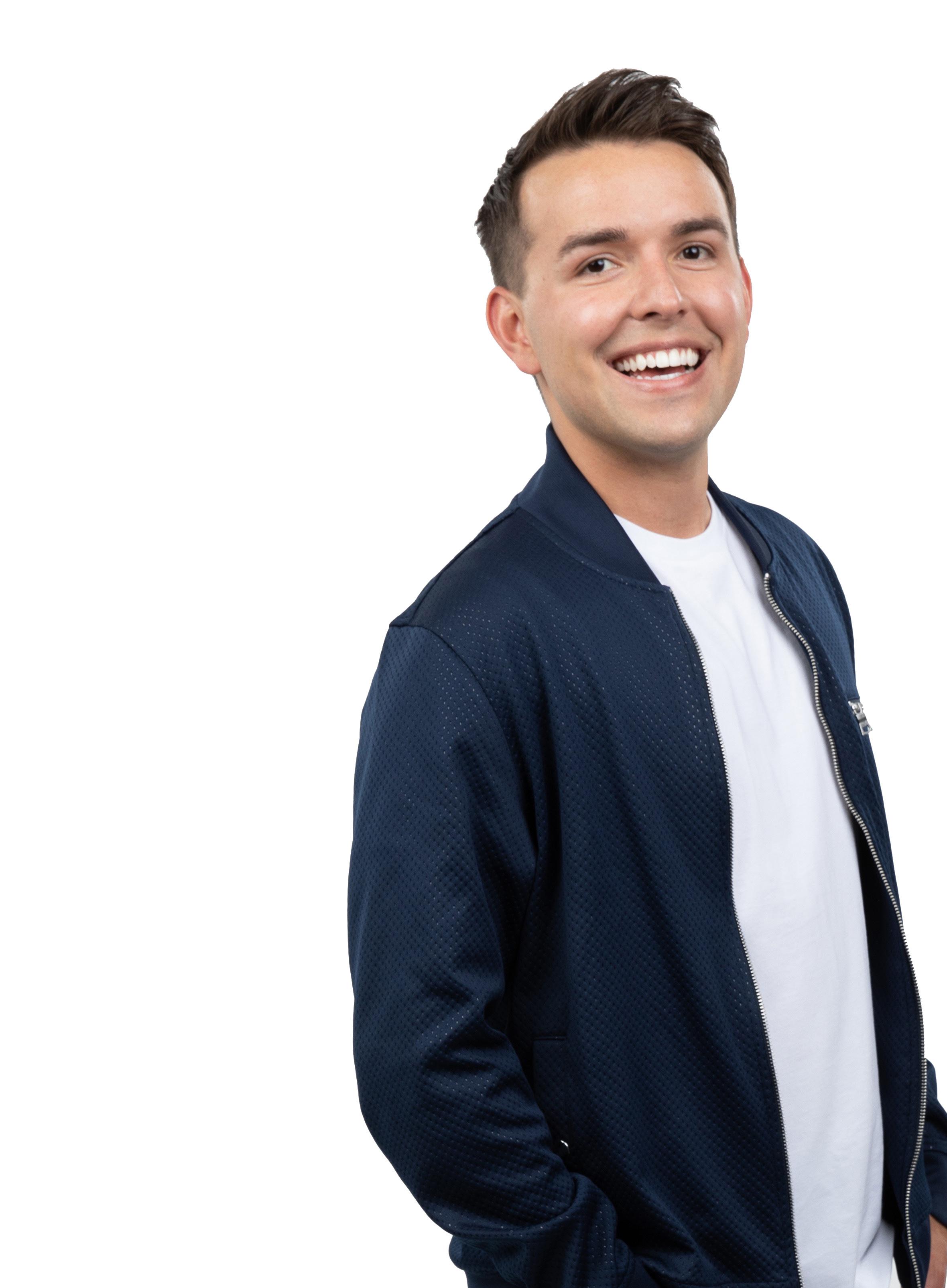
feel to this day. She would start every class and come in and say “Hello, future nurses.” And just by saying “hHello, future nurses,” made us realize we will get through it. And that one day we’re going to be nurses, and that she sees as not being lower than her. We’re all in this learning process together on a learning journey. So she’s someone I think about all the time. She made me feel just so warm and so safe with her. I try to take that energy and feeling into my show and NurseCon at Sea. How do I make people feel? How does the show make people feel? How do the people on this cruise feel?
What do nurses tell you after seeing one of your comedy shows?
That I’ve been following them with a hidden camera because we all go through the same thing. They’re not alone. Some nurses say they considered leaving the profession because they’re so stressed out, and they just really needed this night. What’s so cool about my shows is nurses come in party buses. So they come in groups of like 30 and 40. They make t-shirts and posters, and the energy is unbelievable and wild. And again, even at my shows, you have the younger and more experienced nurses of all ages and backgrounds coming together. And that is just, like, so cool. So I think it’s just relatability. I’m telling my stories, how they happened in my life and my years as a nurse, and seeing what others went through is my most common feedback. Like we’re all missing a bladder scanner. Like
we’ve all had the patient that’s pulled their Flexi-Seal™ out.
What inspirational message would you like to share with the next generation of nurses? Know you have a voice. If there’s ever something you’re passionate about and want to change, do it, because if you don’t, who will?
Reneé Hewitt is the editor-inchief and content strategist for Minority Nurse. When enjoying life unplugged from the digital world, you’ll find her on a trail taking wildlife photos or birdwatching.

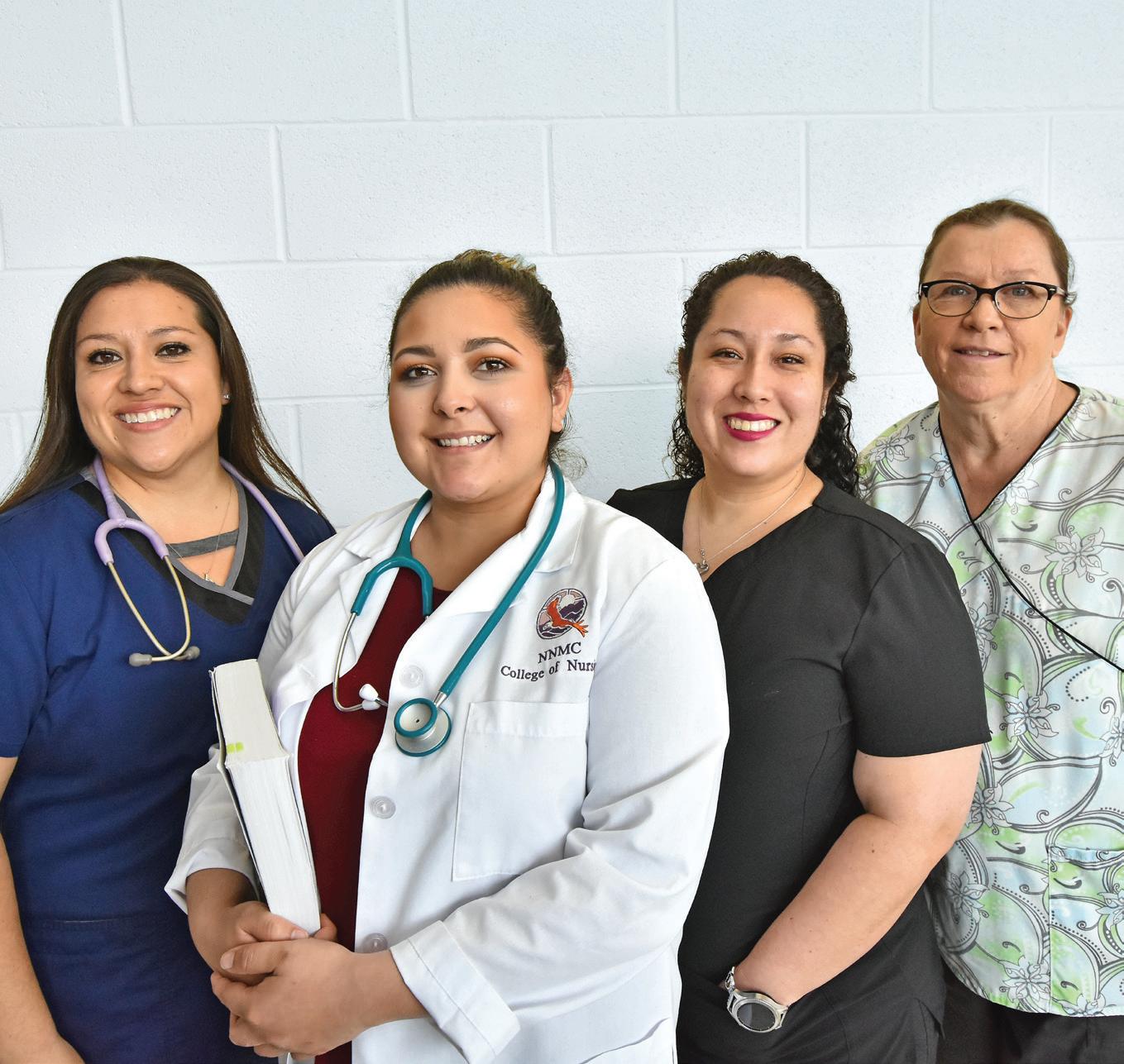
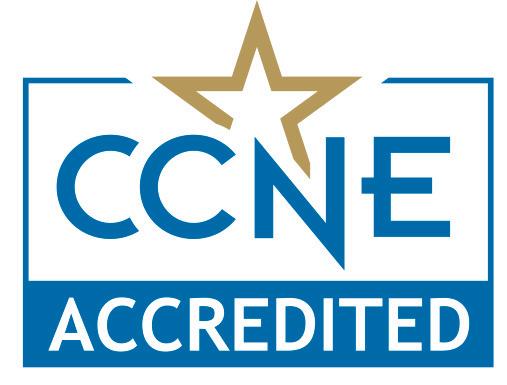
Exhorting nursing staff and leadership to pay attention to the need for diversity, equity, and inclusion (DEI) is all well and good, but how do you put into practice ways and methods that make DEI a reality?
“It all starts with self-reflection,” according to Danielle McCamey, DNP, ACNP-BC, FCCP, assistant dean of strategic partnerships at the Johns Hopkins School of Nursing in Baltimore. “We have to truly take an honest inventory of where we are on our respective journeys and where our biases show up in our practices.”
McCamey is the founder/CEO of DNPs of Color, an initiative to create and nurture a community of doctor of nursing practice (DNP)-prepared nurses of color.
Having gained that awareness and accepting that you will make mistakes, educate yourself and step outside your comfort zone, she says. “Take inventory of what your circle of friends’influence looks like. Do they represent diverse perspectives and voices? What positions of power and privilege do you hold, and how do you take up space for yourself? How do you show up and advocate for others who may not share the same level of privilege?”
Most important, she notes, is to, “Take action. Utilize your skills, knowledge, and position. If you see something isn’t right, say something. You might save a life in that moment or give someone the gift of recognizing their areas of growth to do better.”
Nurse leaders, she notes, can work to implement DEI policies by including different
voices and perspectives at the table to speak on policies. “The more buy-in you have on different levels, the more people will feel included and engaged, and they will work to ensure that DEI culture and policies achieve their intended goals.”
Nurse leaders can advance DEI in various ways, according to Margaret Rosenzweig, PhD, CRNP-C, AOCNP, FAAN, distinguished service professor of nursing and professor of medicine at the University of Pittsburgh School of Nursing. They include:
• Ensuring that the vision for DEI is shared and active.
• Educating staff and colleagues on how to address bias and promote DEI.
• Create events and space for hospital staff to work with the community in assessing needs and promoting health.
According to Crystal Beckford, chief nursing officer (CNO), recruitment and retention of a diverse nursing workforce are key to DEI efforts at Luminis Health Doctors Community Medical Center in Lanham, Maryland. Some 83% of the nursing staff is now diverse.
“We’ve made a concentrated effort to speak, teach, coach, and mentor at area nursing schools, historically black colleges and universities, and community colleges,” notes Beckford. “Our efforts include offering internship opportunities for students that hopefully lead to future employment.”
She notes that this year, she worked closely with the Maryland Hospital Association, nursing leaders, and state lawmakers to pass legislation to create a Pathway to Nursing Pilot Program. Across several pilot sites at community
colleges, the program will provide support services to Licensed Practical Nurses (LPNs) to lower attrition rates, increase the number of LPNs and potentially the number of Registered Nurses, and advance educational partnerships with local health systems, according to Beckford.
In addition, Beckford notes that monthly “Coming To The Table” sessions provide a platform for candid conversations that celebrate diversity and encourage mutual understanding. Moreover, the hospital fosters belonging and professional development through
several Business Resource Groups (BRGs), with the African American BRG being the largest. These groups offer networking, mentorship, and advocacy spaces, empowering employees to thrive in an inclusive environment.
McCamey received the AACN Pioneering Spirit Award in May, at the National Teaching Institute & Critical Care Exposition.
Louis Pilla is a seasoned publishing expert with over 20 years of experience providing content and digital products to healthcare audiences.
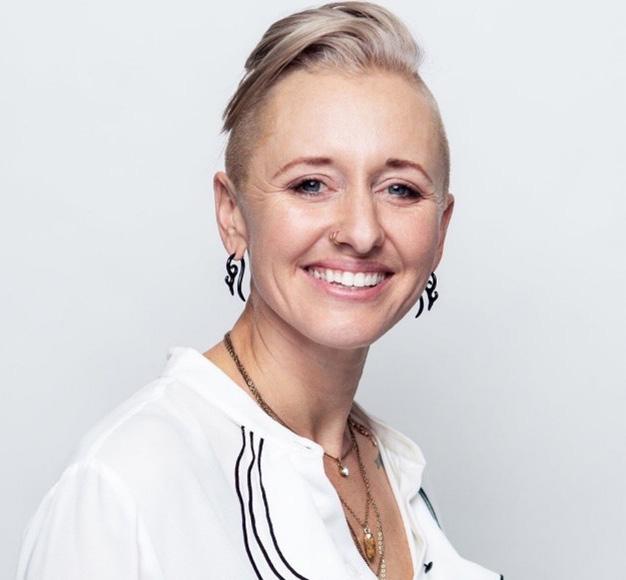 By Reneé Hewitt
By Reneé Hewitt
Cara Lunsford is the VP of Community at Nurse.com, fostering a community where nurses can find peer support, allies, professional opportunities, resources, and education. She’s also the host of Nurse.com’s NurseDot Podcast and a member of the LGBTQ+ community, highlighting a variety of voices within the nursing industry while also speaking to her personal experiences as an RN and founder of HOLLIBLU, a social networking app exclusively for nurses (acquired by Nurse.com in 2022).
Lunsford is an important nursing leader, and Minority Nurse is pleased to profile her as part of the Champions of Nursing Diversity Series. The series highlights healthcare leaders who are prominent figures in their organizations and are making transformational impacts in nursing.
Meet Cara Lunsford, RN, CPHON, VP of Community at Nurse.com.
Talk about your role in nursing. Beginning my career in pediatric oncology, I witnessed firsthand the effects such a stressful job can have on a nurse. I observed my peers experience burnout and abuse daily. I heard their stories of adversity, trauma, and hope and joy. With my fellow nurses at Children’s Hospital Los Angeles (CHLA), we started the first Supportive Care Committee to ensure nurses had an environment available to help cope with job stress. However, there remained a greater need for resources like this committee at every hospital and for
nurses throughout healthcare sectors to improve retention and recruiting.
Realizing the broader need for a safe and supportive community and the potential technology had to solve this issue, I had the idea to found HOLLIBLU, the first social media network for nurses. The app was designed to provide peer support, professional advice, and connections with other nurses. In 2022, HOLLIBLU was acquired by Nurse.com, where I was brought on as vice president of oommunity to oversee the Nurse.com app platform.
To continue amplifying voices within the nursing community, we launched the NurseDot Podcast late last year. I sit down with my nursing peers to discuss their stories, industry trends, and professional growth advice.
How long have you worked in the nursing field?
I have been in nursing for over 15 years, working in the acute setting as a pediatric oncology, home health, and home infusion nurse. Throughout the past five years, I have used my clinical knowledge as a registered nurse (RN) to take on an entrepreneurial role, delivering technology solutions to my fellow nurses to help with everyday challenges. Most recently, I have been using my voice and platform in the nursing space to elevate other nurses, fostering a supportive community for nurses of all specialties and settings.
Why did you become a nurse?
I started my career as a nurse in pediatric oncology back in 2008 at CHLA. Before that, I worked as an American Sign
Language interpreter at Cal State Northridge, where I discovered my interest in oncology. For two consecutive semesters, I interpreted the Biology of Cancer class, and as I was listening and interpreting, I became more interested in oncology and the nursing profession in general. Ultimately, I was so intrigued that I was motivated to embark on a career in nursing. From there, I went to Los Angeles County College of Nursing and Allied Health, where I received an Associate of Science degree and became an RN.
What are the most important attributes of today’s nursing leaders?
Successful nurses and nursing leaders are empathetic, drawing from personal experiences and truly listening to others from different backgrounds. Having navigated the healthcare system as a queer family put me in the patient’s shoes rather than the clinician’s, with which I was very familiar. My wife and I had a child with two HIV+ gay men, and we all continue to co-parent together. To have our son, we had to meet with multiple IVF clinics and experienced professionals who were either unfamiliar with our family situation or had stigmas around HIV and LGBTQIA+ healthcare issues. I understand what it is like to be rejected from care because of the stigma around your sexuality and hurtful preconceived notions. As a queer nurse, I need to share my experiences with patients and fellow nurses to create a better care environment for everyone and foster the best possible results for all patients, regardless of background.
With this experience as a patient, I can relate to the struggles my patients are going through. Similarly, as a nursing leader, I understand the struggles of my peers. This knowledge allowed me to create an app to support nurses best and care for their needs. To care for patients you do not know, sometimes nurses must put their own mental health and personal life on the back burner, requiring nurses to be extremely caring and understanding. While this means caring for patients of all backgrounds, it also means putting yourself in their shoes.
What does being a nursing leader mean to you, and what are you most proud of?
It’s important to acknowledge that nurse leadership brings tremendous responsibility. Nurses have faced unprecedented challenges in the past few years, resulting in a staffing crisis. The solutions nurses seek will require that people across healthcare get aligned on the reasons behind this crisis. Nurse leaders are being called to use their voices and platforms to ensure these messages reach the decisionmakers within this industry. I had spent most of my career being the squeaky wheel, speaking up even when it was unpopular. I have taken huge personal and professional risks to create a safe space for nurses and bring awareness to their challenges. But with risk came great reward. Nurse. com believed in my mission and vision. In March 2022, they acquired my company, brought our small but mighty team into the Nurse.com family, and are helping us to continue our mission of providing
a vibrant community where nurses thrive.
Tell us about your career path and how you ascended to that role. After years of nursing and founding HOLLIBLU, I was drawn to Nurse.com given its 30+ year legacy. The biggest thing that pushed me to collaborate with the company was its mission, which completely aligned with mine. Nurse.com aims to improve the lives of the most vulnerable members of society and those who care for them. As a nurse, this resonated with me deeply. It is a company I wanted to associate myself with and help build toward this mission by including the app I was so passionate about creating.
What is the most significant challenge facing nursing today?
Following the COVID-19 pandemic, the broader public became abruptly aware of nurses’ important role in the
healthcare system and their daily challenges. In this postpandemic world, with severe nursing shortages putting increased pressure on healthcare staff, nurse burnout and professional stress are incredibly high, not to mention the grief and trauma that comes from caring for patients.
As a nursing leader, how are you working to overcome this challenge?
Nurses need resources and support to equip them with the skills to deliver better care. The last few years have proven that nursing is one of our society’s most demanding and crucial jobs, so we must do something about it. It is vital to provide nurses with adequate resources and a supportive community to deal with burnout and improve their mental health. Nurses need accessible and practical training to help them advance in their careers and targeted job postings to help them find the best roles that
fit their interests and experience. At Nurse.com, we put nurses’ needs first, providing them with a community of peers, reading materials, continuing education courses, and the ability to take control of their career paths.
What nursing leader inspires you the most and why?
A few nurse leaders come to mind, but I would start with Rebecca Love. Rebecca has been working to empower and elevate the nurse profession, whether it’s through grassroots initiatives, like founding the non-profit SONSIEL (Society of Nurse Scientists, Innovators, Educators, and Leaders) or giving TED Talks about how nurses can drive healthcare innovation. Most recently, Rebecca has set her sights on a significant issue: the insurance reimbursement of nursing services. The Commission for Nurse Reimbursement explores the history of how the rates of nursing services were once
set by the nurses themselves and how changes made over 100 years ago have resulted in nurses now being a cost instead of a benefit to hospitals.
What inspirational message would you like to share with the next generation of nurses? Nursing is a marathon and not a sprint. If you want to work in this profession for decades, it is important to prioritize your personal needs, practice professional boundaries, and know when to say “no” or “not right now.” Remember that you are human first. Practicing awareness will help you identify when to change, so don’t be afraid to leave your comfort zone and try something new.
Reneé Hewitt is the editor-inchief and content strategist for Minority Nurse. When enjoying life unplugged from the digital world, you’ll find her on a trail taking wildlife photos or birdwatching.


“It is unlike any other online education program.”— Maria Labadie-DeGennaro, FNU Alumna
What Sets FNU’s DNP Program Apart:
• Affordable Tuition Rates and Scholarships Available
• In Collaboration with Your Clinical Site, Lead a Rapid Cycle Quality Improvement Project
• 150+ Doctorally-prepared Expert Nurse-Midwife and Nurse Practitioner Faculty
• Supportive Community of Staff and Faculty
• Mission Focused on Serving Rural and Underserved Communities
• One Three-day Campus Immersion Experience With a Small Cohort of Students
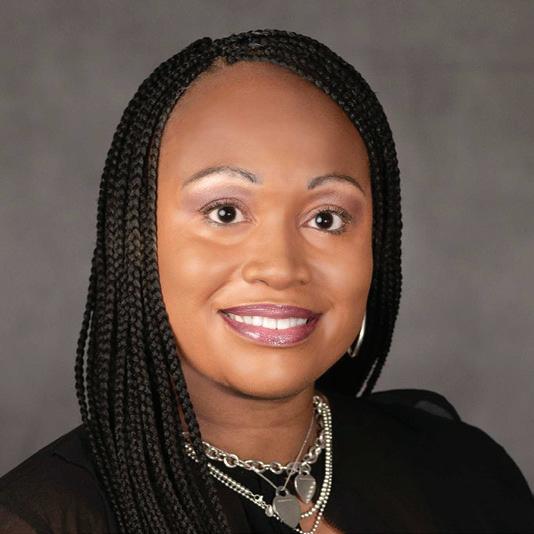
“Everyone is very supportive at FNU and every person that I have been in contact with has made me feel that they all want me to achieve my goal.”

Frontier Nursing University is honored to be a recipient of the 2023 HEED Award for the sixth consecutive year.
 By Shannon Whittington
By Shannon Whittington
As nurses, no matter where we are in our careers, we all know there is always more to learn. In my 30-plus years as a nurse, I’ve also realized that while it’s essential to keep up with and, when appropriate, incorporate the newest technology and medical advances, we need to spend just as much time learning how to understand and relate to our patients as people.
Working in the home care field here in New York City at the home- and communitybased nonprofit VNS Health, my colleagues and I serve an incredibly diverse population. Our clinical teams are wellversed in the needs of those we serve. But over the years, it became clear to many of us across clinical specialties that one community was falling under the radar when it came to our education and training: trans and nonbinary individuals.
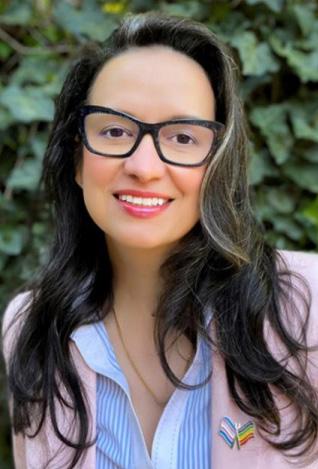
Whittington,
As a gay woman, I’ve been acutely aware of the stereotypes and presuppositions
that have historically been held by many healthcare professionals when it comes to caring for the LGBTQ+ community. In addition, I have always been personally and professionally motivated to improve the world for those within our “rainbow” community. For trans and nonbinary individuals, in particular, the healthcare system has not always been a caring or positive space. A 2023 KFF/Washington Post survey found that nearly half of trans adults reported that “their health care providers know ‘not much’ or ‘nothing’ about how to provide care for trans people.”
The real-life implications of these gaps in gender-affirming medical care cannot be understated. For example, the psychological toll that occurs when one’s sex assigned at birth is misaligned from one’s gender identity, known as gender dysphoria, has both physical and mental health repercussions. As the NIH has found, this misalignment can be a contributing factor for increased depression and anxiety, low self-esteem, and, in some cases, even increased chances of self-harm or suicide. Further exacerbating the situation, when individuals with gender dysphoria experience discrimination and stigma, it can heighten the negative impacts of their condition.
As I grew in this profession, I knew that if I wanted to become a better nurse, I needed better education—and so did others. During my work, I would ask nurses across the country what they knew about delivering care to transgender populations. While my colleagues wanted to know more,
there was also a lack of opportunities for nurses to access this specialized training.
In 2016, together with my VNS Health colleagues, I was part of the team that launched VNS Health’s Gender Affirmation Program (GAP) to address the unique needs of transgender and nonbinary people as they recover from gender affirmation surgery at home. Besides providing top-notch care to patients, a big focus for our team involves training nurses and other clinicians who work with trans and nonbinary individuals, empowering them with the tools they need to provide care and advocacy for individuals recovering from gender affirmation surgery.
What started as an idea has blossomed in just a few short years: GAP has now served more than 4,000 individuals and trained over 800 clinicians on how to better serve trans and nonbinary people.
Asha Lyons, a social worker with GAP, witnesses the impact this specialized training has on the lives of the patients we serve daily. The program has also been a catalyst for positive
transformation among the program’s nurses. Lyons notes that some nurses working with their first GAP patient might be nervous or fearful, and they won’t be knowledgeable enough to address their patient’s needs. With training, however, they gain the confidence to be fully present and supportive of our patients.
“The change starts when a clinician begins to observe a trans person’s experience firsthand in the safe harbor of their home,” says Lyons. “It is more than a major milestone—it’s a personal and defining life step. When the clinician sees a client accomplishing such a powerful transformation, they can’t help but feel the impact, too. You become inspired to help this remarkable person heal, succeed, and grow.”
Beyond understanding the physical implications of recovery from gender-affirming surgery, our GAP nurses and social workers are also taught to be mindful of the societal and mental health challenges that often accompany this transformation. It is an exciting time for many, but we also
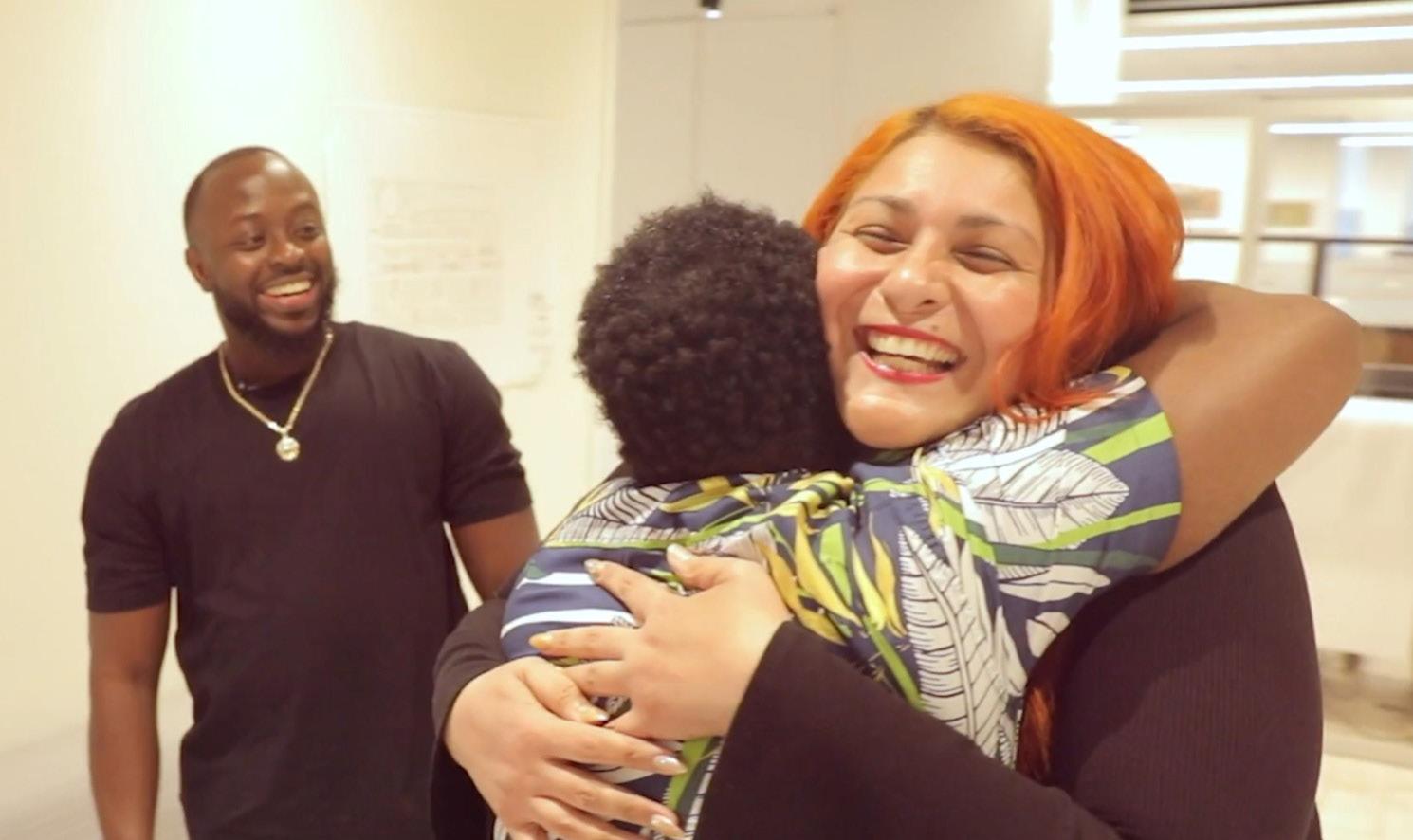
have patients who have lost their jobs after their employer found out what kind of surgery they have had or whose families refuse to accept their new identity and aren’t there to support them.
As an individual of trans experience, Lyons is acutely aware of the complicated mix of both positive and negative feelings that can exist simultaneously as a patient recovers. “For many of our patients, this time can really bring up concerns around safety because so many have had to navigate life never knowing if a person they encounter is going to react to their identity with violence or hate,” she says. “It is on us as clinicians to make sure from the very start that our clients feel seen and supported.”
“These patients need love, care, and support,” agrees
VNS Health Home Care nurse
Debbie Starace, who has firsthand experience caring for GAP patients. “As a nurse, the number one role we play is that of an advocate.”
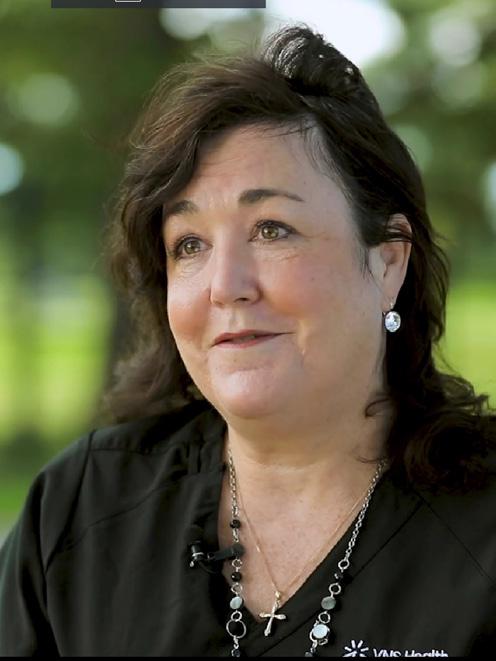
Debbie Starace, a VNS Health Home Care nurse, says the number one role nurses play is that of advocate.
Starace had one patient around the age of her
daughter. On one early visit, she instructed her patient on how to use a dilator, and she found herself feeling almost maternal as she encouraged patience. “I had to remind them that it’s a really exciting time, and I know you’re excited about these changes, but recovery takes time.” As Debbie notes, compassion for patients is at the heart of nursing. “It doesn’t matter what the color of our skin is, what our sexuality or gender is, or where we come from. We just need to be kind,” she says.
Nurses in our program often use their new-found skills to educate others, sharing what they’ve learned with their peers. As the number of individuals undergoing gender affirmation surgery grows, these skills will be in ever greater demand. Most of the
nurses I know are curious by nature, and I’ve heard from many nurses working in a wide variety of specializations that they are eager to train and learn more about this area.
Ultimately, our team hopes that one day, every clinician, whatever their specialty, feels armed with the knowledge to provide compassionate care to all, including trans and nonbinary individuals, and to help their patients feel cared for, supported, and understood as their true, authentic selves.
For more information on the VNS Health Gender Affirmation Program, visit https:// www.vnshealth./home-care/ gender-affirmation-program/.
Shannon Whittington, DNP, MSN, RN, CCM, LGBTQ+ Health, is the clinical director of VNS Health’s Gender Affirmation Program
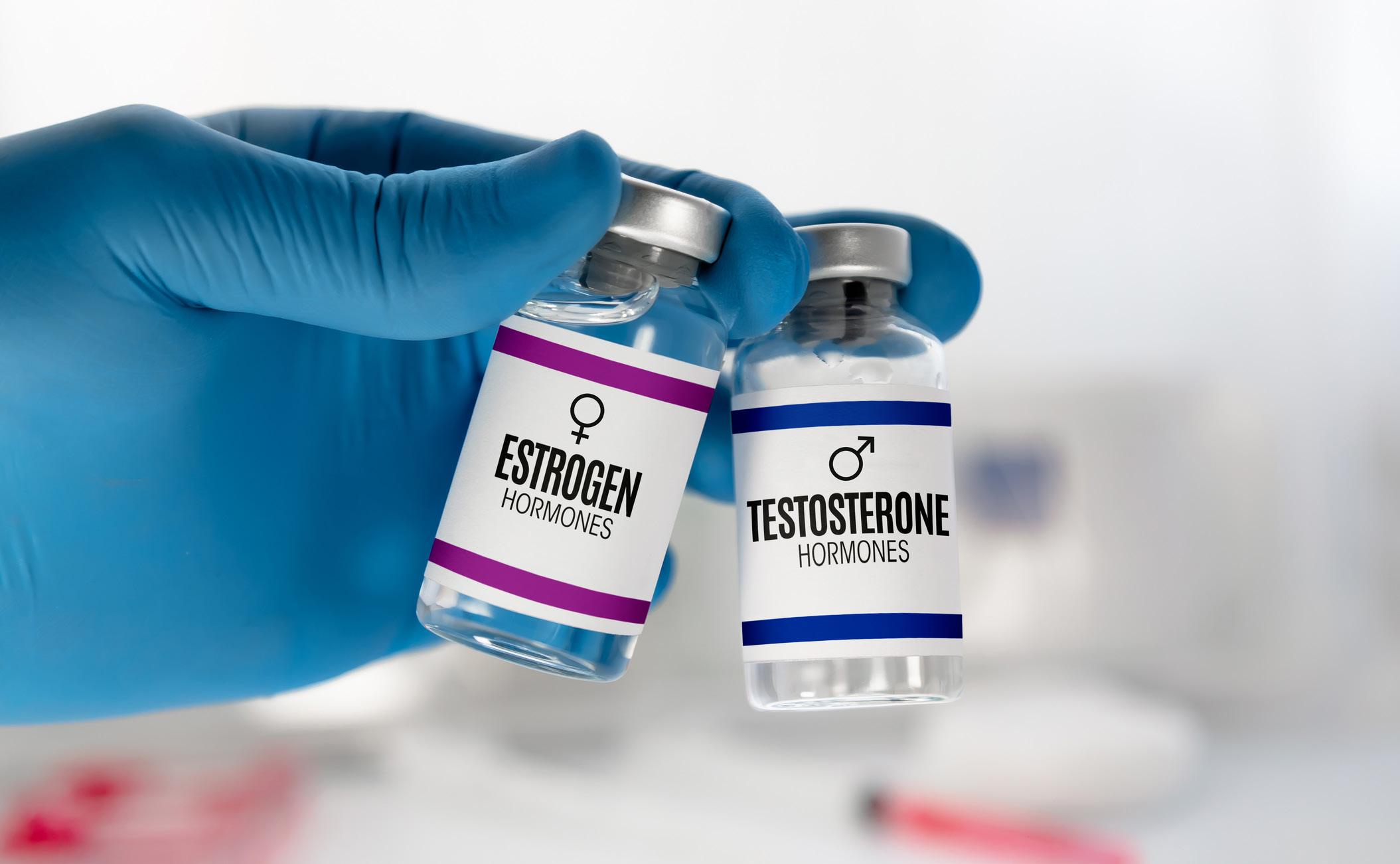

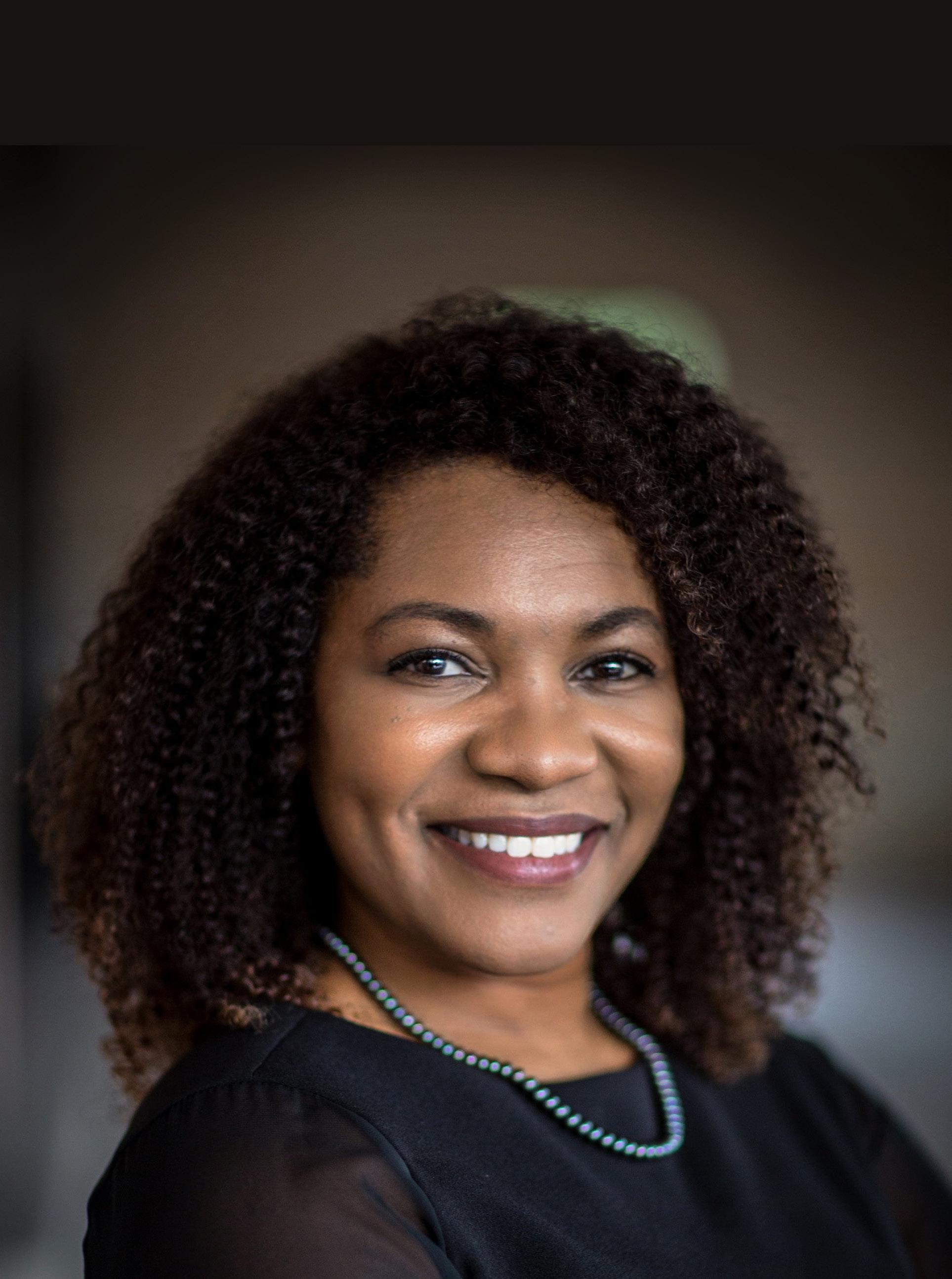 By Reneé Hewitt
By Reneé Hewitt
Robin Geiger, DNP, MSN, APRN, NP-C, FNP-BC, NEA-BC, is an accomplished, results-driven, board-certified nurse executive with over 20 years of hands-on clinical leadership experience. Dr. Geiger’s professional focus is on health equity and clinician advocacy. Through the ACT (Advocacy, Career, Tools) program for all clinicians within the Ingenovis Health brands, Dr. Geiger aims to increase resilience for healthcare providers, improve quality care, and create solid support systems.
With a long-standing history of assembling impactful and forward-thinking teams emphasizing improving healthcare quality and increasing patient safety, Dr. Geiger’s vast experience includes accreditation and developing policies to support foundational programs through assessment and data analysis. She previously served as associate dean of academic affairs for the National University School of Health Professions and focused on strategic planning, clinical program development, and academic operations.
Dr. Geiger is an important nursing leader, and Minority Nurse is pleased to profile her as part of the Champions of Nursing Diversity Series. The series highlights healthcare leaders who are prominent figures in their organizations and are making transformational impacts in nursing.
Meet Dr. Robin Geiger, senior vice president of clinician advocacy of Ingenovis Health
Talk about your role in nursing. As senior vice president of clinician advocacy for Ingenovis
Health, I’m pleased to lead our ACT program, which is focused on clinician wellbeing, resilience, and support. I hold board certification as a nurse executive advanced (NEA-BC) and chair our Chief Nurse Advisory Board, an interdisciplinary advisory group focused on creating solutions for current frontline clinician challenges.
I support the nursing community as much as possible. I serve as an editor-in-chief for a medical publishing company, focusing on nurse practitioner certification and nursing ethics. I also remain current in clinical experience as a boardcertified family nurse practitioner (FNP) and cofounder of an NP-owned concierge practice in North Florida.
How long have you worked in the nursing field?
I’m surprised to say that I have been working in this field for more than 23 years!
Why did you become a nurse?
My interest in nursing peaked at an early age. I would hear stories about my grandmother, who was a nurse midwife, stories of how she helped others heal, and stories of the need that would always exist for people to receive healthcare. I would stare at her nursing picture, in which she wore a white dress and cap. She was my earliest influence in nursing; she looked like me and was someone I could relate to.
I started with the goal of becoming a certified nursing assistant (CNA). I wanted to handle the humble and respectful connection of bedside care. I immediately loved it! It was important to me to be there for some nursing home
patients with little to no family and support them in accomplishing daily tasks. I knew I could grow in nursing and pushed myself to do more.
What are the most important attributes of today’s nursing leaders?
Today’s critical attributes for nurse leaders should incorporate an empathetic, resourceful, and advocacy approach. Considering the social climate when engaging new and existing nurses is essential. External factors to keep in the forefront include mental health and bandwidth, which stem from work-life balance, something I like to refer to as a “work-life blend” when assigning and delivering care and being supportive means including flexible options for staffing that align with a nurse’s history and respect for years of service, as well as physical, social, and emotional support.
What does being a nursing leader mean to you, and what are you most proud of?
Being a nurse leader means factoring in previous personal experiences of my own and those around me. An excellent example would be the formation of Ingenovis Health’s interdisciplinary Chief Nurse Advisory Board (CNAB). Solid decisions involve a multidisciplinary approach to healthcare strategy and design. Multidisciplinary teams provide a more global lens of how decisions impact all, from the social worker to the clinician and all the people who serve the patient.
I am proud to give back to the community by cofounding a concierge health clinic for the under-served population,
creating MSN and DNP programs that consider the working nurse, and developing a clinician well-being program to encourage improved worklife blend and foster resilience - the ACT program
Tell us about your career path and how you ascended to that role.
I’ve touched almost every area of nursing through lived experience, either as faculty, clinician, or leader. My life in nursing began first as an intensive care unit (ICU) nurse, followed by staffing various ICUs, ER, and OR at a levelone trauma hospital. I became a family nurse practitioner in multiple areas, including as an RN, first assisting in plastics, orthopedics, and general surgery. I have always mentored nurses along the way, and opportunities to serve as lead faculty, director, and associate dean in academia provided me ample opportunity to do so. I received my most impactful leadership training at the Veterans Health Administration. My career has included national leadership roles as VP of clinical care at a non-profit organization and later as co-owner/ CEO of a concierge clinic. My current role as senior vice president of clinician advocacy for Ingenovis Health allows me to combine my previous experience to support all clinicians – I enjoy what I do!
What is the most significant challenge facing nursing today?
Recognizing the importance of self-care is always challenging for nurses. I’m also guilty of this from time to time. Nurses are natural givers, and we often neglect the importance
of reflecting on challenges, trauma, and the losses we experience. We provide our best care when we reflect on our experiences and learn from them. Covid was challenging, but we didn’t experience initial trauma and burnout with the pandemic. Nurses are strong –we have constantly been challenged. I’m glad we are now focusing on better health for the nurse, something we have needed for quite some time.
As a nursing leader, how are you working to overcome this challenge?
I’m working daily to be an example of incorporating selfcare and eliminating stress. Ingenovis Health supports the ability to grow support and enhance the lives of frontline clinicians through the ACT program. I’m proud to lead this program, which is focused on providing a voice of advocacy, career pathing/ support, and
tools to foster better mental and physical health. I think of the program as an ongoing conditioning and strengthening program to ensure our clinicians are prepared to lend their best selves to caring in various areas within healthcare.
What nursing leader inspires you the most and why?
Dr. Hollier is one of the many nursing leaders that inspires me. I found her certification guidelines and manuals amazingly insightful and well-written from a practical point of view. She inspires my entrepreneurial spirit to create better ways of accomplishing milestones and mentoring others to greatness.
What inspirational message would you like to share with the next generation of nurses?
We are all capable of more. You’ll receive a new challenge when you think you’re comfortable and have it figured
out. Grow from each challenge by adding it to your toolbox. You’ll soon have a nice box of tools/experiences to reach for and share with other nurses.
Allowing yourself to grow through mentorship will open ideas and create lifelong connections you didn’t know you needed. Participate in shared governance and nursing associations to strengthen the profession and lend your voice and support.
Finally, consider that one day, we will all become patients. You are influencing the future care for your family and yourself. Thinking this way is powerful; this forwardthinking always leads to positive and motivating actions.
Is there anything else you’d like to share with our readers?
There’s a personal quote I often use, “Everything revolves around the need to receive and deliver education.” This
doesn’t apply to academia as it might seem but to life in general. Nurses are lifelong learners. We don’t teach emotional and social learning in every education program, but to continue shaping this profession, we must learn how and when to share our stories to inspire others.
Reneé Hewitt is the editor-inchief and content strategist for Minority Nurse. When enjoying life unplugged from the digital world, you’ll find her on a trail taking wildlife photos or birdwatching.
